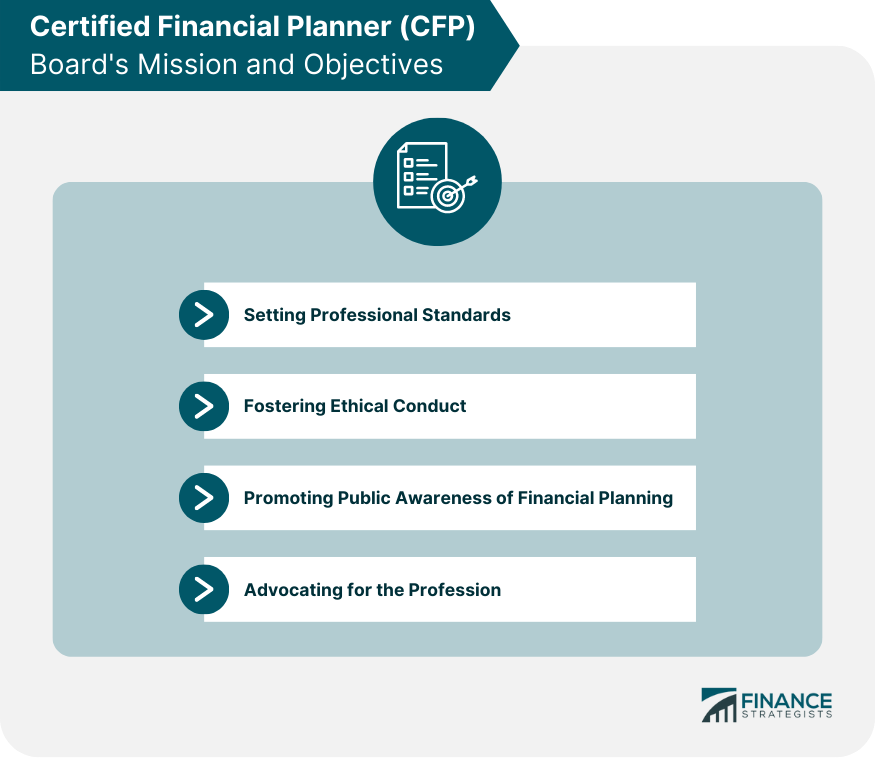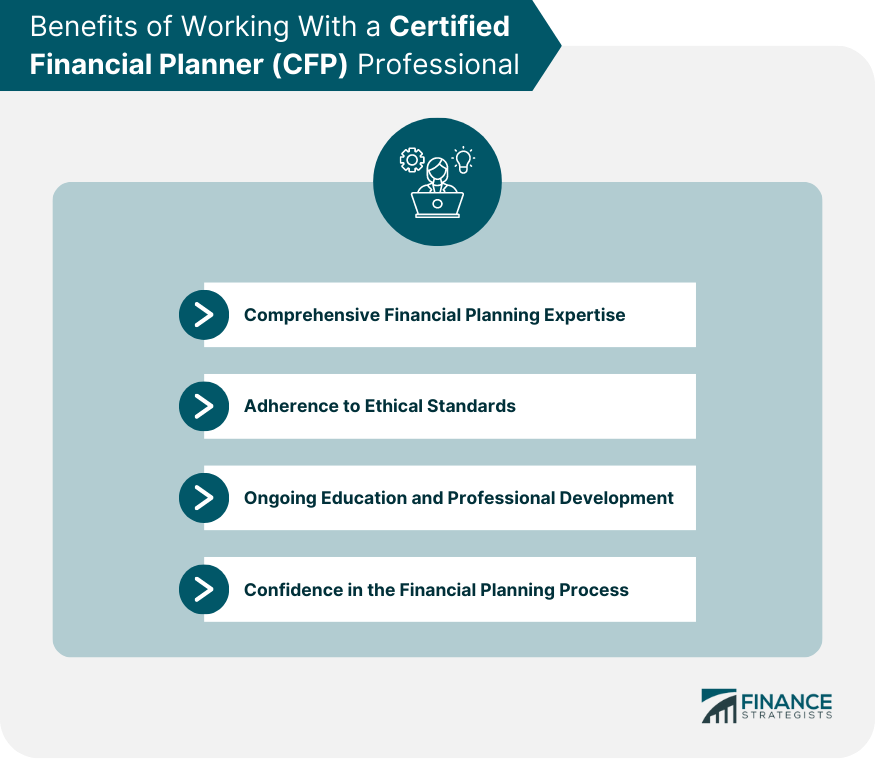The Certified Financial Planner Board of Standards is a non-profit organization that oversees the Certified Financial Planner (CFP) certification in the United States. The CFP Board sets the standards for financial planning professionals, ensuring that they possess the knowledge, skills, and ethical conduct necessary to provide comprehensive financial planning services to clients. The CFP Board plays a critical role in the financial planning industry by establishing and maintaining professional standards, fostering ethical conduct, and promoting public awareness of the importance of financial planning. To become a CFP professional, candidates must meet the following requirements: Candidates must complete a comprehensive course of study in financial planning, either through a CFP Board-approved education program or by holding certain recognized credentials or degrees. Candidates must pass the CFP Certification Examination, which tests their knowledge and competence in financial planning. Candidates must have at least 6,000 hours of professional experience in financial planning or 4,000 hours of apprenticeship experience that meets specific criteria. Candidates must adhere to the CFP Board's Code of Ethics and Standards of Conduct, and pass a background check. The CFP certification is considered the gold standard in the financial planning industry, signifying a financial planner's commitment to providing competent, ethical, and professional services to clients. The CFP Board sets the professional standards for financial planners, including educational requirements, examination criteria, and experience qualifications. The CFP Board promotes ethical conduct among financial planners by establishing a Code of Ethics and Standards of Conduct and enforcing these standards through monitoring and disciplinary actions. The CFP Board raises public awareness of the value of financial planning and the importance of working with a CFP professional. The CFP Board advocates for the financial planning profession by engaging with policymakers, regulators, and industry stakeholders. CFP professionals are required to act as fiduciaries, putting their clients' best interests first when providing financial planning services. CFP professionals must maintain their competence through ongoing education and professional development. CFP professionals are expected to provide diligent and thorough services to their clients. CFP professionals must protect their clients' confidential information. CFP professionals are required to act with integrity, avoiding conflicts of interest and upholding the trust placed in them by their clients. CFP professionals must act professionally, treating clients and colleagues with respect and adhering to high standards of conduct. CFP professionals possess the knowledge and skills necessary to provide comprehensive financial planning services, addressing a wide range of financial needs and goals. CFP professionals are held to high ethical standards, ensuring that clients receive unbiased, competent, and professional advice. CFP professionals are required to engage in ongoing education and professional development, ensuring that they stay current with industry developments and best practices. By working with a CFP professional, clients can have confidence in the financial planning process, knowing that their financial planner has met rigorous standards of competence and ethical conduct. The CFP Board monitors the conduct of CFP professionals, ensuring that they adhere to the Code of Ethics and Standards of Conduct. If a CFP professional is found to be in violation of the Code of Ethics or Standards of Conduct, the CFP Board conducts an investigation and, if necessary, initiates disciplinary action, which can range from private censure to suspension or revocation of certification. The CFP Board requires CFP professionals to complete continuing education requirements, ensuring that they maintain their competence and stay current with industry developments and best practices. When selecting a CFP professional, it is important to evaluate their qualifications and credentials to ensure that they have the necessary expertise in financial planning. Consider the CFP professional's years of experience and the specific areas of financial planning in which they specialize, ensuring that they can address your unique needs and goals. Choose a CFP professional with whom you feel comfortable discussing sensitive financial matters and who communicates effectively in a way that you understand. Ask for referrals from friends, family members, or other professionals who have had positive experiences working with a CFP professional. Select a CFP professional with a clear and transparent fee structure, ensuring that you understand the costs associated with their services. The Certified Financial Planner Board of Standards plays a crucial role in the financial planning industry by setting and maintaining professional standards, promoting ethical conduct, and raising public awareness of the importance of financial planning. The CFP certification is a valuable indicator of a financial planner's commitment to providing competent, ethical, and professional services to clients. By establishing and enforcing rigorous standards, the CFP Board ensures that clients receive high-quality financial planning services from professionals who prioritize their clients' best interests. When selecting a CFP professional, it is essential to consider their qualifications, experience, communication style, and fee structure. By choosing a financial planner who meets the stringent requirements set forth by the CFP Board, clients can be confident in their ability to address unique financial planning needs and goals. Ultimately, partnering with a CFP professional ensures a higher level of expertise and ethical conduct, which can significantly impact clients' financial well-being and overall financial planning success.What Is the Certified Financial Planner Board of Standards (CFP Board)?
The CFP Certification
Requirements for CFP Certification
Education
Examination
Experience
Ethics
Importance of CFP Certification for Financial Planners
CFP Board's Mission and Objectives
Setting Professional Standards
Fostering Ethical Conduct
Promoting Public Awareness of Financial Planning
Advocating for the Profession

CFP Board's Code of Ethics and Standards of Conduct
Fiduciary Duty
Competence
Diligence
Confidentiality
Integrity
Professionalism
Benefits of Working With a CFP Professional
Comprehensive Financial Planning Expertise
Adherence to Ethical Standards
Ongoing Education and Professional Development
Confidence in the Financial Planning Process

The Role of the CFP Board in Regulating CFP Professionals
Monitoring and Enforcement of Ethical Standards
Investigation and Disciplinary Process
Ensuring Continued Competence Through Ongoing Education
Choosing a CFP Professional
Evaluating Qualifications and Credentials
Assessing Experience and Expertise
Compatibility and Communication Style
Referrals and Recommendations
Fee Structures and Transparency
Conclusion
Certified Financial Planner Board of Standards (CFP Board) FAQs
The CFP Board is a professional organization that sets the standards for financial planning professionals who hold the Certified Financial Planner (CFP) designation. The board's mission is to promote the highest standards of ethics, education, and professional conduct in the financial planning profession.
The CFP designation is a professional certification for financial planners. It is awarded by the CFP Board to individuals who meet the education, experience, and ethics requirements of the organization. The designation is recognized as the highest standard in financial planning.
To become a Certified Financial Planner, an individual must meet the education, experience, and ethics requirements set by the CFP Board. This includes completing a CFP Board-Registered Education Program or a financial planning-related degree, passing the CFP Certification Examination, and fulfilling the experience and ethics requirements. Once these requirements are met, the individual can apply for the CFP designation.
Certified Financial Planners provide a range of financial planning services, including retirement planning, investment management, estate planning, tax planning, and insurance planning. They work with clients to develop a comprehensive financial plan that takes into account their unique needs, goals, and risk tolerance.
You can find a Certified Financial Planner by visiting the CFP Board's website and using their "Find a CFP Professional" search tool. This tool allows you to search for CFP professionals in your area and filter by areas of specialization, compensation method, and more. You can also ask for referrals from friends, family, or other professionals such as attorneys or accountants. It is recommended that you interview multiple candidates and select a Certified Financial Planner who you feel comfortable working with and who has experience in your specific needs and goals.
True Tamplin is a published author, public speaker, CEO of UpDigital, and founder of Finance Strategists.
True is a Certified Educator in Personal Finance (CEPF®), author of The Handy Financial Ratios Guide, a member of the Society for Advancing Business Editing and Writing, contributes to his financial education site, Finance Strategists, and has spoken to various financial communities such as the CFA Institute, as well as university students like his Alma mater, Biola University, where he received a bachelor of science in business and data analytics.
To learn more about True, visit his personal website or view his author profiles on Amazon, Nasdaq and Forbes.











